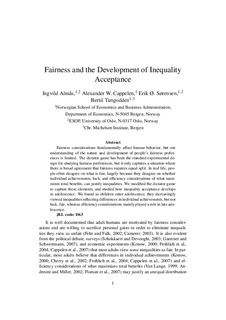Fairness and the Development of Inequality Acceptance
Journal article, Peer reviewed
Permanent lenke
http://hdl.handle.net/11250/299686Utgivelsesdato
2010Metadata
Vis full innførselSamlinger
- Articles (SAM) [119]
Sammendrag
Fairness considerations fundamentally affect human behavior, but our understanding of the nature and development of people’s fairness preferences is limited. The dictator game has been the standard experimental design for studying fairness preferences, but it only captures a situation where there is broad agreement that fairness requires equality. In real life, people often disagree on what is fair because they disagree on whether individual achievements, luck, and efficiency considerations of what maximizes total benefits can justify inequalities. We modified the dictator game to capture these features and studied how inequality acceptance develops in adolescence. We found that as children enter adolescence, they increasingly view inequalities reflecting differences in individual achievements, but not luck, as fair, whereas efficiency considerations mainly play a role in late adolescence.
Beskrivelse
-This is the author's version of the article:"Fairness and the Development of Inequality Acceptance", Science 28 May 2010: Vol. 328 no. 5982 pp. 1176-1178.
